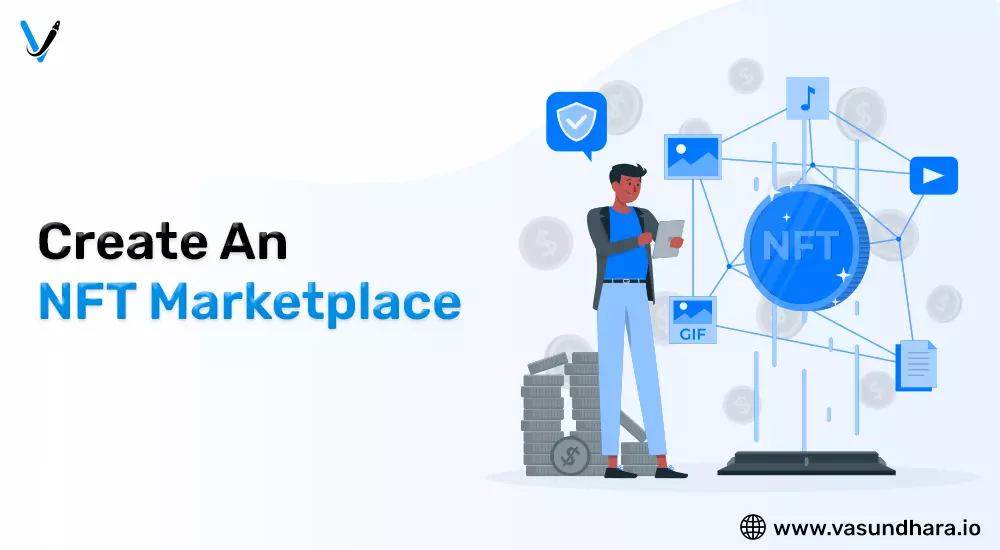A Step By Step Guide To Develop An NFT Marketplace


- Aug 30, 2022




NFT is a term that you have heard a lot over the past few years. It has drawn so much attention that, in 2021, Collins Dictionary selected it as its Word of the Year.
It technically allows you to uniquely identify and associate the ownership of digital assets in the world. In recent years, cryptocurrency and digitalization have become increasingly popular for buying and selling digital assets.
In this blog, let's discover NFT and the NFT marketplace, besides understanding the basics of NFT marketplace development and why it is worth creating one.
A non-fungible token (NFT) is a unique digital identifier. While people can copy an image, the original file remains secured. For example, you are viewing artwork in a museum. When you enjoy one of the artworks so much that you go to the museum store and buy a print for your home, the original will be in the same place.
It is based on the same blockchain technology that supports cryptocurrencies like Bitcoin and Ethereum.
NFT has been around since 2014, but 2021 was the first year it broke through the mainstream of buying and selling digital art. It keeps a clear record of ownership of the artwork. Hence, you can make an NFT and sell it easily on NFT marketplaces without the help of a third party.
At the NFT marketplace, all the NFTs are listed for sale by worldwide creators. It has become an opportunity for individuals to create their own identities and represent their artworks to encourage effective digital asset management.
One of the most famous NFT marketplaces is Opensea and Rarible which are built on the Ethereum blockchain network.
Most of the developers are using Ethereum, Binance, Smart Chain, Solana, Cardano, and Polygon blockchain networks for NFT marketplace development.
Why are NFT Marketplace Needed?
The NFT market has become a massive digital pool that comprises huge transactions, non-traceable, easily compatible, amazing usability, user authorization, and easily usable.
NFT minting is much more than coding for a blockchain platform. Therefore, before you start developing an NFT marketplace, it is essential to know its workflow. It consists of many security, business, and technology aspects.
NFT marketplace development starts with a sign-up on the platform. The following are significant elements of the NFT marketplace workflow.
A user needs to install a digital wallet (or crypto wallet) to store purchased NFTs. Generally, it protects secret information and gives users control over their digital assets like private keys. Marketplaces can work with multiple crypto wallet providers (like MyEtherWallet or WalletConnect) to support a large client base.
It is a major part of the NFT marketplace for auctions and sales. Sellers can organize a sale of digital artworks at a fixed price and a virtual auction at a minimum price and time period as well. Buyers create bids, and the highest bidder at the end gets a chance to purchase that NFT.
Smart contracts are stored on the Blockchain network. It is an executable digital contract between a buyer and seller during a sale. When both of them agree to the terms, the contract automatically authenticates and the transaction turns out irretrievable.
Create a user-friendly NFT marketplace platform with a simple but interactive front-end and a well-structured back-end to support blockchain technology.
The NFT market has become a massive digital pool that comprises huge transactions, non-traceable, easily compatible, amazing usability, user authorization, and easily usable.
There are several NFT marketplaces available. But are you aware of the types in which they are categorized? Here they are.
It is a marketplace where you can purchase and trade unique NFTs. Most of the artwork is released in a copy or less quantity per work. Therefore, the value of NFT gets extremely high on this platform.
It is an appropriate platform for collectors who wish to have a collection of unique artworks. SupeRare, Foundation, and KnownOrigin are examples of Exclusive NFT marketplaces.General NFT Marketplace
This is a platform for all types of NFTs in different styles, quantities, prices, and features. It helps the majority of people in NFT minting, purchasing, and selling and creates the highest trading volume.
OpenSea, Binance, Magic Eden, and ImmutableX are some of the General NFT marketplaces.
As the name suggests, it is used for particular types of NFTs, such as in-game items, sports collections, songs, or videos. Specific NFT marketplaces make it easier for users to trade assets.
It helps them to track market fluctuations and respond more quickly than in the common marketplace. The development of a specific NFT marketplace requires big projects to encourage users to trade on that platform.
A user can see every transaction clearly that takes place in the market. NFT initiates instant payments in cryptocurrency that do not require personal information or card details to access the trading platform. It ensures an error-free payment process and smooth transactions with a blockchain network.

Data can be replicated and distributed across various blockchain networks. But every time a new block is generated and the NFT platform updates its blockchain to accommodate changes.
It is the most important feature of NFT development that it has in-built security features, cryptography, and Smart contracts that safeguard against online fraud, security breaches, or other cyber threats.
A software development company can create NFT marketplace apps that will allow users to perform tasks (such as buying, selling, or publishing an NFT) more efficiently. Hence, considering some useful features of the NFT platform will be worthwhile.
As the NFT marketplace is similar to an e-commerce site, it requires a front-end storefront that is attractive and intuitive. And you have to decide how much information needs to be displayed for each file.
It also tests the rareness of NFTs. While a user cannot duplicate an artwork, he can share multiple NFTs of the same artwork. Hence, marketplaces give them labels like "Number 2 of 10".
You have to decide the scope of the artwork you will trade. Marketplaces like OpenSea are markets that handle any kind of NFT. But you need a search function to make the buying process faster.
The search filter is also one way to improve a buyer's experience. People (like investors, collectors, and others) view NFTs from a different perspective. Hence, this feature will help users sort items by various categories such as price, rarity, and artist.
Registered users can list the minted NFTs on their previous dataset. For sellers, the marketplace will list data about artwork viewers and bids during an auction. Creators can keep track of their NFT and notify them when someone makes an offer.

NFT developers provide several selling mechanisms for your site. Timed auctions can offer the best prices for popular artists' NFT because, with the growing competition, costs can rise quickly, and towards the end of the auction, bidding can be elevated.
Direct buying and selling will be easier than using smart contracts on the blockchain.
The wallet enables users to sell and purchase digital assets with cryptocurrency. Users are more concerned about the security of their crypto wallets. Hence, new NFT marketplaces should offer them to work with their crypto wallets.
Ratings work as a helpful tool for both buyers and sellers. Because most people want to do business with those who have a strong reputation.
It is an integral part of the booming NFTs. Marketplace ensures easier and more flexible access to NFTs and resolves the conventional issues of revenue streams for creators. The profound growth in several NFT marketplaces has become a topic of concern for everyone.
Here, we have listed some of the top NFT marketplaces that will help you to discover various types of NFTs.
The world's first and largest NFT marketplace is OpenSea. It offers the easiest way to keep track of your NFT collection and discover new assets.
Rarible works as a business template in which users can buy and deal with Ethereum, Flow, and Tezos. It provides a seamless, peer-to-peer gateway into the NFT market.
The National Basketball Association developed the NBA Top Shot marketplace for sports fans. Here you can find collectibles, memorable moments, video clips, highlights, and artwork related to basketball.
Binance is a platform that brings together artists, innovators, and crypto enthusiasts to develop and exchange top NFTs.

The premiere marketplace for NFTs is Nifty Gateway, which offers a diverse range of art and collectibles offered as curated drops and verified drops.
An exclusive crypto art marketplace, SuperRare lists a curated array of digital artwork produced by prominent NFT creators and budding artists.
In 2021, an Ethereum-based NFT marketplace Foundation is launched. It is a platform for artists to build a new economy with the use of the Ethereum blockchain and have a stronger connection with supporters.
Crypto.com is a highly curated NFT marketplace to discover exclusive digital collectibles and their non-fungible tokens.
The leading online marketplace, NFT Launchpad is for NFT creators, collectors, and investors.
Once you have decided the features you want to include in your app, it will get easier for the end-to-end development of your NFT platform, which generally includes the following steps:

Before starting the development process of your unique NFT marketplace, you should consider these stages:
1. Target audience
2. Propose users' roles
3. Define your project and design
4. Move to creation
5. Apply Smart Contracts token generator
6. Examine and deploy
After getting an idea of the must-have elements of your marketplace, you will be able to calculate the development price further.
As the world is moving towards an online platform, the NFT marketplace development is set to boom. It can be a complex process in the beginning, but deploying a successful marketplace for users will become a rewarding experience for you.
An NFT development company can become the right choice for you because it will not only help you to create your own NFT platform but also guide you in the best way with their blockchain expertise.
Copyright © 2026 Vasundhara Infotech. All Rights Reserved.